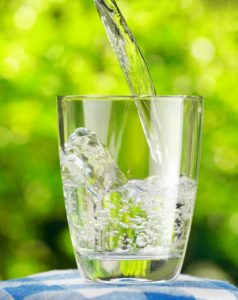 Water makes up about the difference between feeling drained and running like a well-oiled (read: hydrated) machine. Dehydration can set in, causing dry mouth, tiredness, and headaches (no wild partying required). Another reason to drink up: Getting the right amount fluids daily could be 60 percent of the human body.
Water makes up about the difference between feeling drained and running like a well-oiled (read: hydrated) machine. Dehydration can set in, causing dry mouth, tiredness, and headaches (no wild partying required). Another reason to drink up: Getting the right amount fluids daily could be 60 percent of the human body.
It’s essential to replace the water our body is constantly losing by breathing, perspiring, and— ahem— using the bathroom. We use that H 2 the Izz-O to flush toxins, carry nutrients around the body, and protect sensitive tissue, like the nose and mouth. For adult males, that means about 3.7 liters of fluids per day (nearly 16 cups), while ladies need roughly 2.7 liters (or 11 cups) per day, studies show.
But not all fluids need to come from water or even liquids. Everything from milk to fruit juice and even coffee, tea, and soda can contribute to our daily fluid intake, though water is still the best bet for avoiding excess calories. On average, food also provides about 20 percent of our daily fluid intake, but it can account for more if we reach for water-rich foods like fruits and veggies (think lettuce, oranges, tomatoes, etc.).
So taking into account that 20 percent from food, in a temperate climate, men need to drink 3 liters (about 13 cups) of fluids daily, and women need 2.2 liters (about 9 cups).
Just Add Water — The Answer/Debate
But not everyone’s hydration needs are the same. Age, climate, activity level, and illness can all effect daily needs— and how much we’re each affected by those factors varies, too. Some researchers even suggest sedentary humans in climate-controlled environments need not worry about the old 8×8 rule. Studies show thirst may be a better guideline than numbers, since most of us get plenty of H20 just by letting our conscience— err, mouths— be our guide. And there’s no need to overdo it. Drinking more water than we need doesn’t necessarily have any added benefits (unless frequent runs to the bathroom could be considered a benefit).
But don’t be fooled into thinking only hot temps require upping the water intake. When the weather outside is frightful, all those layers can cause sweating, and dry, heated indoor air can sap skin of moisture. No matter what the weather, when exercising, drink one to two cups pre-workout and an additional half to one cup every 15 to 20 minutes. Post-gym, continue to replace any lost fluids and electrolytes (that means 16-20 ounces per pound of body weight lost during the workout). When in doubt, urine color (yeah, we went there) can be a good indicator of whether the body’s getting enough H20. When well hydrated, urine should be light yellow or colorless— though we don’t recommend calling in a pal for a second opinion (that’s what doctors are for, right?).
The Takeaway
On average men need 3.7 liters of fluids per day, and women need 2.7 liters. All fluids count, including milk, juice, coffee, tea, and even water-rich foods. Thirst and urine color might be better guidelines for staying hydrated. Weather, activity level, illness, and age can all impact water needs.
Do you aim for a daily allotment or just drink when you’re thirsty? How much water do you drink per day?
Adapted
